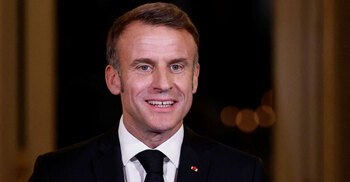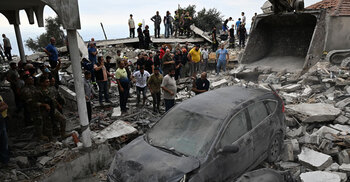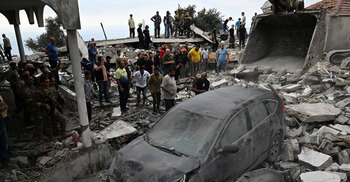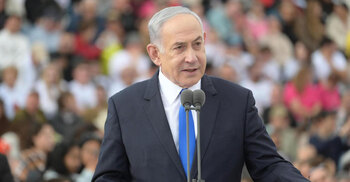Macron warns Netanyahu against ‘sowing barbarism’ in remarks on Lebanon

Emmanuel Macron launched a one-day international conference on Lebanon on Thursday, announcing €100bn of French humanitarian aid and warning the Israeli prime minister, Benjamin Netanyahu, that “civilisation is not best defended by sowing barbarism ourselves”.
He also vowed to help train 6,000 extra Lebanese official forces as he called for a ceasefire and an end to Israeli attacks on UN peacekeepers, for which he said there was no justification.
The twin aims of the French president’s Paris conference are to alleviate the humanitarian suffering in Lebanon and to strengthen Lebanese state institutions including the official army.
In his opening remarks Marcon also said it was a matter of bitter regret that Iran, backers of the Hezbollah group, had “engaged Hezbollah against Israel, while Lebanon’s higher interest required that it stay away from the Gaza war”.
France is hoping to raise €460m at the conference, more than the latest UN target of €400m.
In words directed at Netanyahu, with whom his relationship has deteriorated badly, he said: “We have been talking a lot in recent days about a war of civilisations or about civilisations that must be defended. I am not sure that we defend a civilisation by sowing barbarism ourselves.”
Netanyahu had said on Europe 1 radio on Wednesday: “It is a war of civilisations against barbarism; we are at the forefront of this war and France must support Israel.”
Macron argued: “I am sure of one thing, that the possibility of a civilisation is at stake in Lebanon, that is to say the possibility for women and men whose origins are different, whose religions are different, to share the same territory and to live for the same project.”
He added: “The war must end as soon as possible. There must be a ceasefire in Lebanon. More damage, more victims, more strikes will neither put an end to terrorism nor ensure the security of all.”
He also said that just as he regretted Iran’s actions, he regretted that Israel “continues its military operations in Lebanon, in the south, in Beirut, elsewhere, and that the number of civilian victims continues to increase”.
Israel, he said, “knows from experience that its military successes are not necessarily a victory in Lebanon”.
In a sign of diplomatic tensions with the US, he recalled that he and the US president, Joe Biden, had launched an appeal on 25 September for a 21-day pause and said he regretted that this had still not been heard. Since that appeal, it appears that the US has decided to give Israel a conditional green light to bomb Hezbollah so that it is forced into an unconditional ceasefire.
The US secretary of state, Antony Blinken, declined to attend the conference, instead meeting Qatari leaders closely involved in the Gaza ceasefire talks.
Macron appeared to back a tougher mandate for the UN peacekeepers much criticised by Israel, saying: “It will have to be robust, verifiable and operational enough so that everyone, in Lebanon, in Israel, at the United Nations, is convinced that the Lebanese state will effectively exercise its authority over the entire territory in the long term.”
Hezbollah, with most of its senior leadership killed by Israel, has said it will not talk about its political or military strategy until Israel implements a ceasefire. Israel has said it will continue to weaken Hezbollah, both in Beirut and south of the Litani River.
Since the escalation of hostilities a year ago more than 2,500 people in Lebanon have been killed and nearly 12,000 injured, according to the UN. French efforts to secure a ceasefire rest on Hezbollah clearly stating it is willing to end its war. Conflicting messages have emerged from Hezbollah about whether it is willing to sever the link between the two theatres of war, but France believes if the US were to put pressure on Israel to agree a ceasefire, an agreement could be reached.
That in turn might provide the space to secure a majority in the Lebanese parliament to elect a new president, ending a two-year impasse caused by divisions largely on ethnic grounds.
Israel believes UN resolution 1701, passed in 2006, has never been fully implemented partly owing to the failure of the United Nations Interim Force in Lebanon (Uniful) to take up a key part of its mandate that calls on Hezbollah to pull back north of the Litani, about 30km (20 miles) from the border with Israel. The US envoy Amos Hochstein said on Monday in Beirut that a new, more assertive “1701+” mandate was necessary.
Italy, one of the lead contributors to Unifil, has proposed the creation of a peacekeeping buffer with more personnel and more power, and different rules of engagement between the border with Israel and the Litani. It also supports the training of troops of the regular Lebanese army.
Israel is insisting on the right to maintain access to Lebanese airspace, something no government in Beirut is likely to accept.
Source: The Guardian







